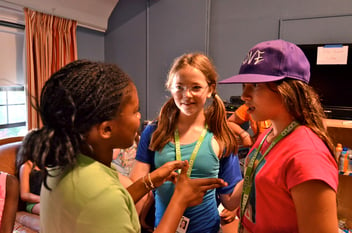Time Away From Home Builds Self Esteem, Independence, and Joy in Kids

This month, as the weather gets warmer and we are gently reminded of the promise of summer, we have been riveted by Michael Thompson’s dynamic and accessible book on the significance — in fact, the essentialness — of a child’s time away from parents. In "Homesick and Happy," Thompson makes a compelling, and in-depth case for letting our kids go so that they may truly grow.
Through research, interviews, anecdotes, and first-hand accounts, Thompson, a clinical psychologist, lecturer, and longtime educator, explains how important being away from home and parents, particularly in summertime, is for our kids. Thompson acknowledges both homesickness and “childsickness” (that is, missing our kids to the point of heartache) as a normal, and necessary part of child (and parent) development, and offers practical advice on how to prepare and cope. He also outlines the distinct and irreplaceable gains that kids can make during their time away. It turns out, there are quite a few things that our children must learn on their own (and we as parents should let them).
What Can’t We Do For Our Kids?
In the book, Thompson highlights eight things we cannot do for our kids. Topping the list? We cannot make our children happy. We cannot give our children high self-esteem. We cannot make friends for our children. We cannot successfully double as our children’s agent or manager. We cannot keep our children perfectly safe (but we can drive them crazy trying). We cannot make our children independent.
What can we do? We can create a loving and supportive environment for our children, and when the time is right (probably earlier than we even think), we can let them go for a little while.
Where Can Our Kids Go to Learn These Critical Skills?
Away! Ideally in the summertime. Ideally overnight. Thompson asserts that the “sweetest” and most enriching moments in a child’s life often do not involve parents. These moments come at a time when a child feels a “psychological ownership” of his or her experience, in environments where exploration is encouraged without judgment or analysis.
Away from parents, Thompson says, kids are “lighter and freer” than they are under the pressures of their very hectic lives at home. In an away-from-home summer experience, kids gain self-esteem in a way they do not under a parent’s watchful eye. That’s because self esteem comes from learning and mastering new things on your own, and not from parental nudging (no matter how well intentioned).
"Confidence is a byproduct of skill formation," Thompson teaches. Not the other way around. Independence is won in this way, too — in order to learn to rely on themselves, children need to learn that they can make it without relying on parents, and that takes practice. Summers away present the perfect opportunity for children to get this valuable practice. “Children are often capable of taking on responsibility that their parents cannot imagine,” Thompson writes.
Taking on these opportunities for growth in confidence and independence is critical, and is ultimately what we want most for our children, but that does not mean it is easy for parents to accept. Thompson recognizes our instinct to protect and shelter our children but warns us not to hold on too tightly — our best intentions could hinder their progress, or unwittingly encourage timidity and risk aversion.
So What Can a Summer Experience Provide That Parents Can’t?
Away from home, Thompson says, children feel responsible for their own growth. "To grow in the ways they need to grow," he writes, “children have to do it on their own, and usually away from their parents." A summer experience away is a unique and magical time for kids to embark on this exploration because summer camps and programs are meccas for imagination, play, and creativity.
It is not a coincidence that so many young people report that their Identities are profoundly shaped by summer experiences, where they feel free to be themselves. Summertime presents a rare time for kids to be outdoors, make a connection to nature, step back from technology, and live more authentically.
A summer program is not school, and away from the pressures of the day-to-day grind that we all feel, kids develop character, a sense of community, skills in independence, a greater ability to make and nurture friendships, and so much more.
What Can We Do to Prepare For Homesickness?
Thompson counsels us that the most important thing we can do to ensure that our children manage homesickness is to have confidence in them. Recognize that homesickness is not a disorder but a normal part of every child’s life, and let your children know that you believe they will absolutely overcome it. Our children respond to our doubts and worries, so have faith.
Talk openly, but optimistically, about your child’s feelings. If you have them, provide success stories from your own experiences of missing home. The best way to prepare our children to be away from home is to have them practice it. Sleepovers with friends or family, as well as overnight school trips, are great opportunities for skill building, because “neither parental reassurance nor parental optimism is going to be anywhere near as effective as a child’s own achievements in persuading himself that he is ready.”
How to Handle it When Homesickness Strikes?
Homesickness can and likely will affect your child at some point during his or her time away from you. It is expected. This is perhaps the biggest opportunity for your son or daughter to confront a challenge and to work through it away from you.
Rest assured that summer program staff are extensively trained to provide loving support to children experiencing the full range of homesickness. In fact, they are ideally and uniquely suited for the task. The young adults at summer programs are perfect role models for your children, providing an energy and magnetism that is hard to beat. These folks are magic makers with expertise in tackling homesickness, whether in the form of a fun distraction or a quiet chat.
For our own feelings of “childsickness,” which is just as common as homesickness, Thompson advises us to take a summer break from parenting and embrace this progress along our own developmental journey. Give your children “the gift of letting go,” and you will all get so much more in return.

For the full story, with a host of relatable anecdotes and practical advice, we encourage you to read Thompson's book, Homesick and Happy: How Time Away from Parents Can Help a Child Grow.



